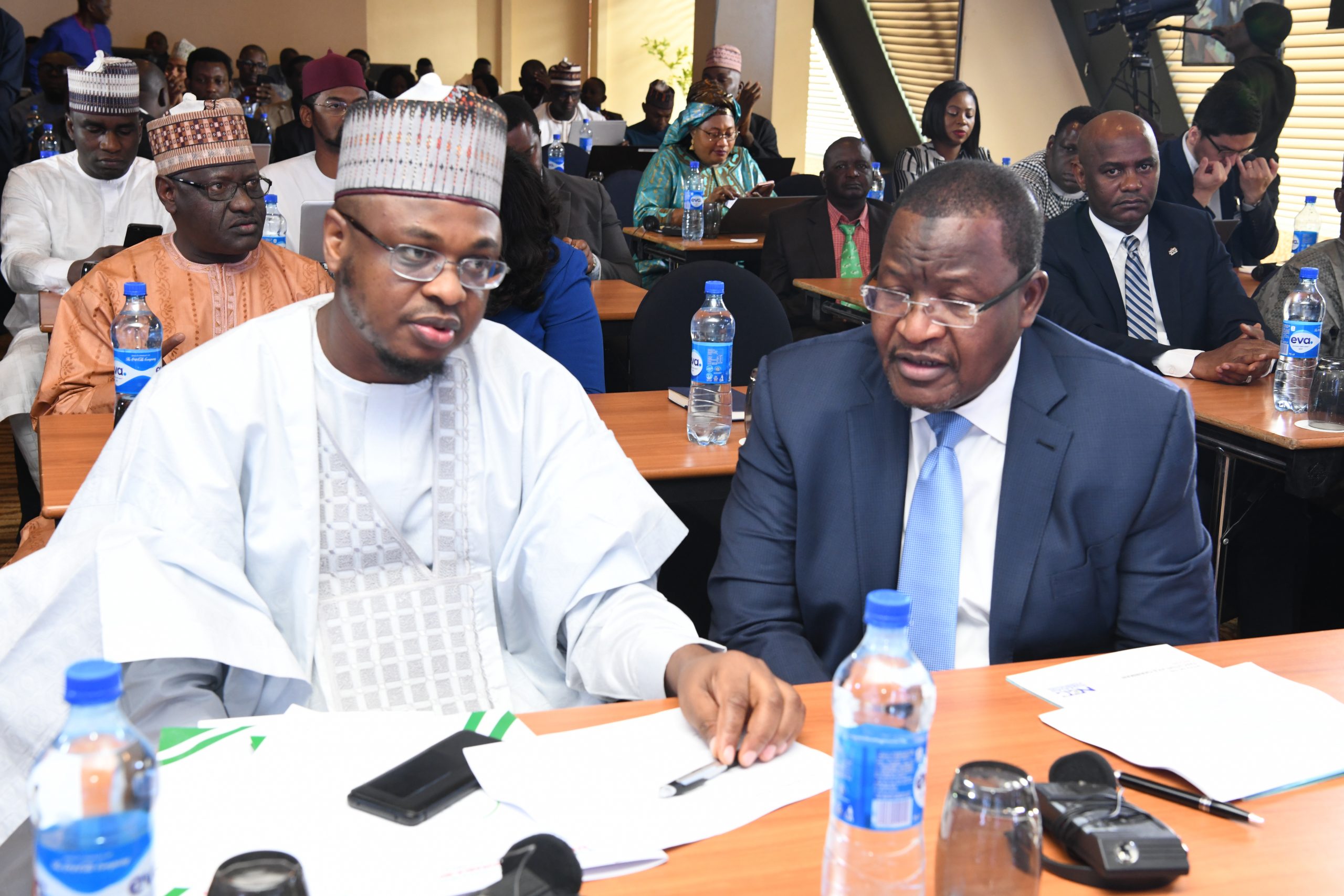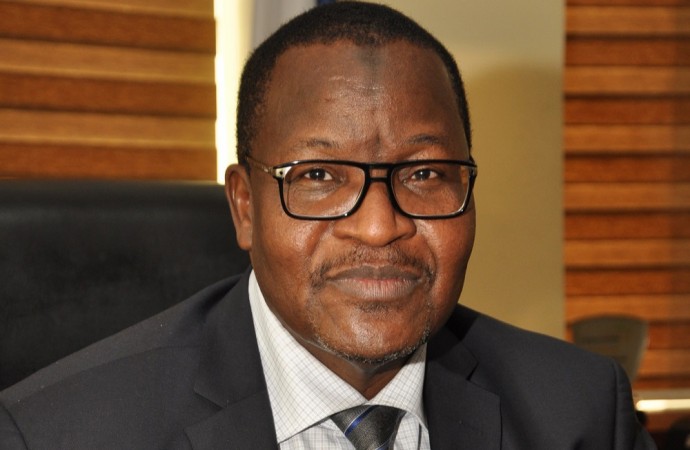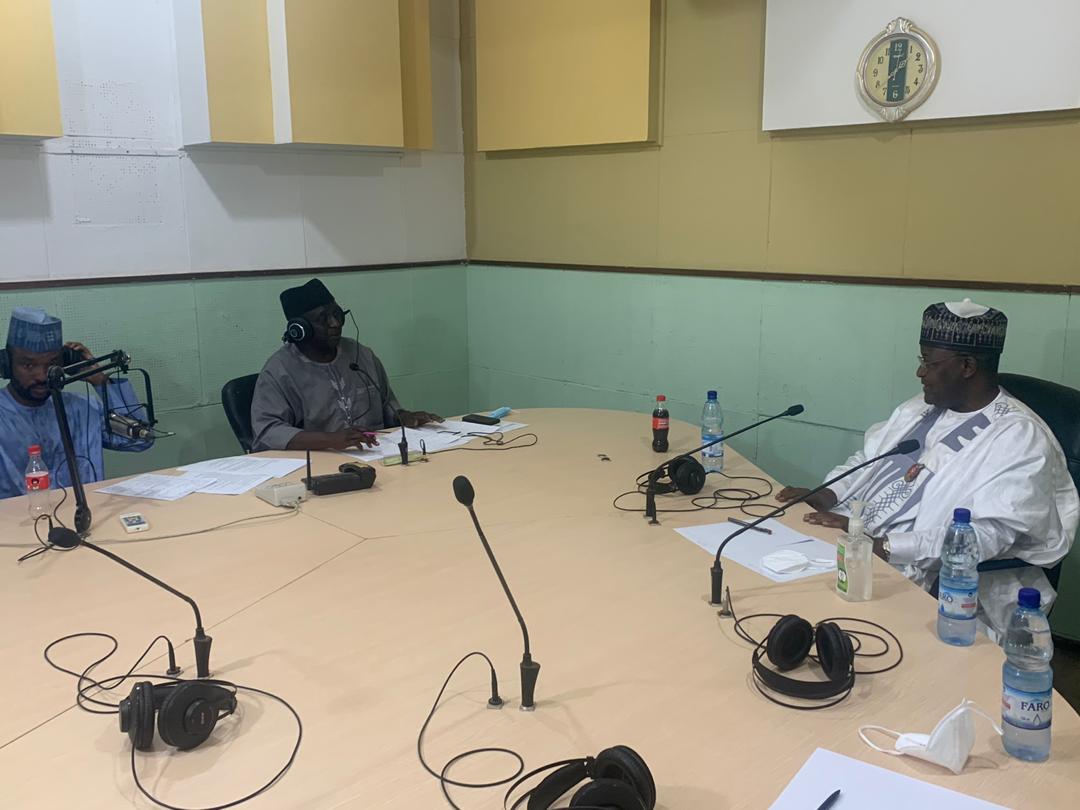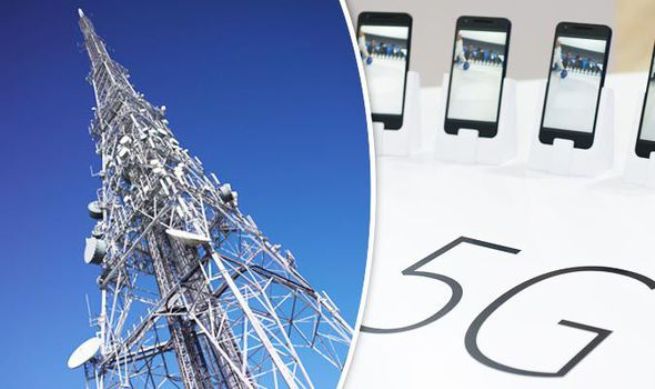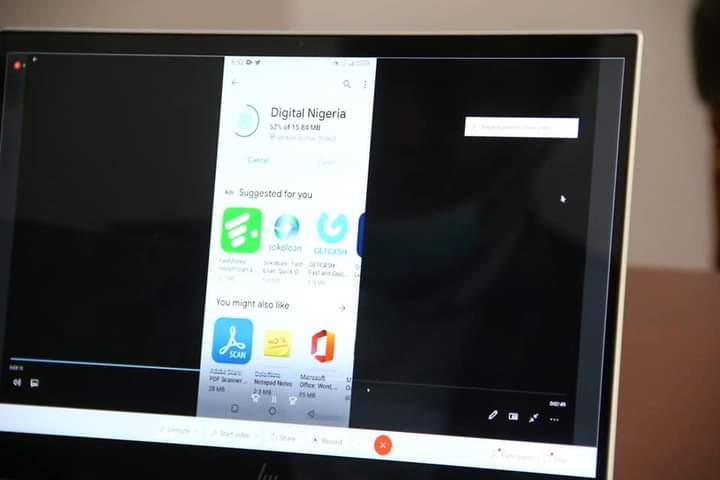No doubt, the year 2020 will pass as one of the busiest year for telecommunications as despite so many being apart from friends and family due to the COVID-19 pandemic, people were still able to connect with each other through online video and audio calling, and in record numbers.
In 2020, people turned to technology to stay in touch and get things done in the face of social distancing and stay-at-home mandates, and video calling became arguably the most in-demand feature.
Telecommunications, which the Nigerian Communications Commission (NCC) regulates in the country, was in the heart of it all.
In this piece, TheNewsGuru.com (TNG) brings you the regulatory impacts of the NCC on the Nigerian telecoms sector in the outgone year.
Telecoms in 2020: A Review of NCC’s Regulatory Activities
For telecommunications sector, the year 2020 has been an eventful year with a lot of landmark regulatory initiatives by the Nigerian Communications Commission (NCC).
The policies, programmes and activities of the Commission have further positively impacted the upward trajectory of the digital ecosystem in the year under review.
Also, the year 2020 came with a lot of challenges but the Nigerian telecommunications sector continued to record significant growth.
The impressive performance and growth, made possible through effective regulatory initiatives emplaced by the telecoms regulator, under the leadership the Executive Vice Chairman (EVC), Prof. Umar Danbatta, was despite the apparent economic recession and headwinds occasioned by the global outbreak of COVID-19 pandemic and its attendant lockdowns, especially in Nigeria.
The effective and future-proof regulatory regime by the NCC, coincidentally prepared the telecoms sector to be able to provide the needed digital valves that helped to keep the Nigerian economy afloat through seamless communication by individuals, businesses and government institutions in terms of voice and data services provided by telecoms operators, at a time when all other sectors of the economy were comatose.
A major development in the industry in 2020 was the reappointment of Prof. Danbatta for another five years term as the EVC of NCC, a presidential action that was resoundingly lauded by industry stakeholders, who described Danbatta “as a round peg in a round hole.” His reappointment and subsequent confirmation by the Senate of the Federal Republic of Nigeria in the third quarter of 2020 also helped to ensure industry sustainability and policy consistency, preparing the industry for increased growth. Danbatta came into office as EVC of NCC in August 2015 for a five- year period in the first instance. The first term ended in August, 2020 after which the he was reappointed by the President.
This sustainability and consistency in the leadership of the Commission and in policy initiatives under Prof. Danbatta in 2020, therefore, allowed the Commission to uninterruptedly carry on with a number of regulatory activities towards ensuring increased access to telecoms services, ensuring increased consumer education and protection, boosting security of life and property, sanitising the industry while also supporting other initiatives that aimed at boosting innovation in the telecoms sector and continuously galvanizing the country’s overall economic growth.
In the year under review, growth statistics and major regulatory initiatives and policies undertaken by the Commission which have continued to put the industry on the consistent path of growth and keep the telecommunications sector resilient to support the national economy, despite the COVID-19 pandemic, are examined.
According to official telecom industry data, the telecoms contribution to the Gross Domestic Product (GDP) increased to over 14.30% as of second Quarter of 2020, according to data obtained from the National Bureau of Statistics (NBS). In financial value, the 14.30% translates to N2.272 trillion in Q2, 2020. Whereas, telecoms contribution as at December 2019 was 10.60%. Also, telecoms investment continued to grow in leaps and bounds in 2020 beyond $70 billion.
Active mobile voice subscribers increased from 184 million in December, 2019 to 208 million by October, 2020. This represents an additional 24 million active mobile lines accessed by Nigerians across mobile networks from December, 2019 to October, 2020. Accordingly, teledensity (the total number of telephone lines per hundred people in an area) increased from 96.76% in December, 2019 to 108.94% by October, 2020.
NCC’s regulatory activities also resulted in increased connectivity in the country. From, 126 million in December, 2019, Internet subscriptions rose impressively 152.9 million as of October, 2020. In the same vein, broadband (i.e. high-speed Internet) penetration maintained an upward swing to 45.93% in October, 2020, up from 37.80% in 2019.
Mobile Number Portability (MNP) service continued to offer wider option of service for telecoms consumers in 2020. In the year under review, 158,128 telecom consumers ported their lines between January-October, 2020, as against over 120,000 lines that were ported in 2019. The increase in MNP service usage is due to increased public education and awareness by the Commission’s head office and its zonal offices, as they intensified awareness on the availability, usage and benefits of MNP across geo-political zones. (Mobile number portability is a service introduced by NCC on mobile networks which allows telecoms consumers to switch from their current network to another preferred network, without changing their mobile number, when they feel a need to do so).
The Commission was able to successfully resolve over 98% of the total consumer complaints received from telecoms consumers via the NCC Toll-Free Number 622, NCC Consumer Portal, social media platforms and written complaints. Subscriptions by telecoms consumers to the NCC’s Don-Not-Disturb (DND) 2442 service reached over 30 million in 2020 compared with 22 million in 2019.
Furthermore, the following are the various regulatory initiatives embarked upon by the leadership of NCC, which has resulted in the impressive aforementioned statistics quoted above. Each of these is examined, in turns, below.
NCC’s New Strategic Management Plan (SMP) to drive Digital Economy
The Nigerian Communications Commission (NCC), in June, 2020, unveiled its new Strategic Management Plan (SMP) 2020-2024 as a pedestal to drive the implementation of the Federal Government’s digital economy vision. The launch of the SMP demonstrated the Commission’s serious improvement in performance matrix and its efforts in accelerating the implementation of the National Digital Economy Policy and Strategy (NDEPS) and the National Broadband Plan (NBP) 2020 – 2025 of the Federal Government. The SMP, according to Prof. Danbatta, is the fulcrum that will aid the NCC in driving its telecom regulatory mandate in the fast-evolving telecoms industry, in the next five years. It will also serve as a roadmap for the future of the Nigerian telecoms sector, taking into consideration the current and emerging trends in the industry and the numerous expectations of the diverse stakeholders. The SMP 2020 – 2024 is the visioning document of the Commission for planning, monitoring, analysing, and assessment of the Commission to meet its goals and set objectives. It has five pillars, which include regulatory excellence, universal broadband, promote development of digital economy, market development; and strategic partnering and 25 intended outcomes. Five critical success factors identified for the implementation of the Strategy include: ownership and commitment, effective communication, human resource capacity, development of and adherence to a strategy development manual; and implementation discipline.
Continuous Driving of ICT innovations for growth
In 2020, the NCC continued its commitment to investing millions of Naira to drive Information and Communications Technology (ICT) innovations in the academia and while also supporting innovative ideas among young Nigerian tech innovators. Aside several ICT innovation challenge and Hackathon programmes such as the Covid-19 Virtual Hackathon initiated and implemented by the Commission, the NCC, instituted and endowed two additional Professorial Chairs to the tune of N40 million in two more Nigerian universities. The two universities – the premier University of Ibadan, Oyo State and Abubakar Tafawa Balewa University, Bauchi State, are endowed with N20 million each over the next two years to embark of massive research to promote innovation to drive socio-economic development in the country. This brings to four the number of tertiary institutions of learning that have benefitted from the NCC’s innovation-driving initiative, having endowed professorial chairs in Bayero University Kano (BUK) and Federal University of Technology, Owerri (FUTO) in May, 2019.
Boosting FG’s revenue generation
The total remittances by NCC into the Federal Government’s coffers from 2015 grew and reached N344bn in 2020. The revenue was essentially generated from spectrum sales, operating surplus and sanctions. So, aside spectrum auctions, NCC also engaged in spectrum re-planning, re-farming to optimise the usage of the scarce resource while it continued to address the quality of service (QoS) delivery through effective monitoring of Key Performance Indicators (KPIs) and development of KPIs for Third Generation (3G) and Fourth Generation (4G) networks. All these are in a bid to ensure improved service delivery to telecom consumers. Interestingly, the Commission has received commendation on this financial performance from the House Committee on Telecommunications, who visited the Commission on an oversight function sometime in October, 2020. The committee commended the leadership of the Commission for its transparency in ensuring remittances to FG’s CRF, considering the current revenue drive of the government. The committee urged the NCC to sustain its current template of ensuring effective regulation of the telecoms sector in a manner that would be more mutually beneficial to the industry players, the consumers of telecoms services and to the Nigerian government.
NCC’s approval for the trial of e-SIM, and national roaming
In line with its commitment to always put Nigeria’s telecoms sector ahead of cutting-edge technologies that can revolutionise consumer experience, the Commission granted approval for two mobile network operators (MNOs), MTN Nigeria and 9Mobile, to carry out trial on the workability of embedded Subscriber Identification Modules (e-SIM) Service in Nigeria. The trial, approved to run for a period of one year, will involve testing 5,000 e-SIMs by the two networks, subject to compliance with a number of regulatory conditions. According to Executive Vice Chairman of NCC, Prof. Umar Garba Danbatta, the primary objective of the e-SIM trial is to assess the technical performance of the e-SIM on telecoms service providers’ network towards eventual rollout, if satisfactory. He said the e-SIMs is a technology that will eliminate the need for physical SIM card slots on mobile devices in the near future, adding that the trial is in line with the Commission’s forward-looking regulatory approach to ensure Nigeria’s telecoms ecosystem is in tandem with global best practices.
Similarly, the Commission also granted approval for MTN and 9mobile trial on national roaming service for a period of three months, commencing from October 14, 2020 to end by January 13, 2020. The two telcos are expected to configure their networks to begin test and simulation for customer experience. The trial approval covers a few local governments, designated as the National Roaming geographic area, in Ondo State. Basically, roaming service will enable a mobile subscriber in Nigeria to automatically make and receive voice calls, send and receive data, or access other services when travelling outside a particular network geographical area by utilising the network coverage of other networks with roaming arrangements to access service. According to the Executive Vice Chairman (EVC) of NCC, Prof. Umar Garba Danbatta, the primary objective of the National Roaming Service trial is to encourage network resource sharing among operators. It is will also lead to operational expenditure (OPEX) optimisation and capital expenditure (CAPEX) efficiencies leading to freeing up of resources to expand mobile network coverage to unserved and underserved communities across the country, which will lead to improved Quality of Service (QoS) delivery to subscribers.
Review of InfraCo project for effectiveness
In the year under review, the NCC began a strategic review of InfraCo framework and their funding options. To this end, the Commission constituted a committee to review the framework for the licensing of Infrastructure Companies (InfraCo) and recommend sustainable funding options for effective implementation of the proposed national fibre project. It should be noted that the constitution of the committee was sequel to the requirements of the new Nigerian National Broadband Plan (NNBP 2020-2025) and reports of relevant committees set up by the Federal Executive Council (FEC), which include the Inter-Ministerial Review Committee on Multiple Taxation on Telecommunications Operators over Right-of-Way (RoW) and the Technical Sub-Committee on Right-of-Way for Deepening Broadband Penetration in Nigeria. These requirements and reports relate to the imperative of reviewing the InfraCo framework to cater for the delays in take-off, change in exchange rate, supply chain and other challenges imposed by the COVID-19 pandemic. Commenting on this, the EVC said, “The InfraCo project is dear to the government because of its ability to enhance robust and pervasive broadband infrastructure to drive service availability, accessibility and affordability.”
Continuous commitment to regulatory excellence, transparency and ethical standards.
The NCC has been ranked highest in terms of compliance to ethics and integrity among other sister agencies under the Federal Ministry of Communications and Digital Economy. The outstanding performance of NCC was contained in the recently released Ethics Compliance and Integrity Scorecard (ECIS), 2020 by the Independent Corrupt Practices and Other Related Offences Commission’s (ICPC). With a total score of 81.15 per cent, the Commission topped the list among three other agencies under the Ministry, which featured in the intra-ministerial agencies’ ranking in ethics compliance and institutional integrity. The National Identity Management Commission (NIMC) emerged second with a total score of 74.05 percent; Nigeria Communications Satellite Limited (NIGCOMSAT) came second with a score of 31.9 per cent while the National Information Technology development Agency (NITDA) occupied the fourth position with 17.65 per cent. The report underscores NCC’s critical role as a member of the Anti-Corruption and Transparency Unit (ACTU), which is the Federal Government’s vanguard for promoting ethics and ensuring compliance to ethical codes within the Nigerian Public sector. The ranking by ICPC, in addition to demonstrating NCC’s commitment to the orderly growth and development of the Nigerian telecommunications industry, underscores the Commission’s strategic role as a key enabler of positive change within Nigeria’s socio-economic landscape.
Further to this, the ICPC has on Thursday, December 10, 2020 in Abuja, inaugurated the NCC’s Anti-Corruption and Transparency Unit (ACTU). ACTU is the initiative of the ICPC, approved by the Federal Government to serve as an in-house mechanism for corruption prevention within MDAs, in line with global best practices of building strong institutions and institutionalising good governance in the fight against corruption. During the inauguration, Danbatta noted that that the ICPC itself has recently attested to the NCC’s high ethical values and professionalism as evident in the 2020 ICPC Ethics and Compliance Scorecard (IECS) report, where NCC topped other agencies in ratings. The EVC said the ICPC’s verdict also lends credence to the 2017 report of the Bureau of Public Service Reforms (BPSR)-piloted Self-Assessment Tool (SAT) deployed in MDAs, where the NCC came off with a Platinum Level (Exceptional) award that NCC was a level 5 (Platinum standard) organization, the highest rating possible under the BPSR Assessment.
Developing MVNO framework for increased telecom access
In the year under review, the Commission developed a Consultation on Mobile Virtual Network Operator (MVNO) Licensing Framework, essentially to bring another segment industry players, who will rely on existing operators’ network to offer services to Nigerians in the rural, remote, unserved and underserved areas of the country.
The MVNO framework is another initiative by the Commission to improve access and connectivity and it is based on NCC’s determination to introduce MVNOs’ services within the telecommunications market of the country. In pursuit of this, the Commission wishes to obtain comments from industry stakeholders and the general public on key considerations, which will be used to formulate a sustainable and efficient MVNO licensing framework, as well as a highly conducive regulatory regime that facilitates growth and development in the telecoms space, through competitive and differentiated services offered by these virtual operators.
Already, the document has been uploaded on the Commission’s website on December 10 and inputs from stakeholders on the MVNO document is expected to be obtained from members of the public within 21 days of the upload of the document on the Commission’s website. According to Executive Vice Chairman of NCC, upon closure of this period, the Commission will engage in deliberation sessions in an expedited manner to finalize its decisions about MVNO introduction in the market. A consultation report will then be generated and published to the public to create awareness of the Commissions decisions.
The Commission further noted that the consultation paper is in line with processes stipulated in the consultation guidelines put forward by the Commission in 2007. The Commission expected all comments received to be considered before making a final decision, although the commission may decline to use or consider anonymous responses. Comments and responses submitted are deemed independent from its respondent’s relationship with the Commission.
Sensitisation on Procedure for Lodging Consumer Complaints
The Commission leveraged its social media platforms and other legacy media to sensitise consumers of telecom services who are dissatisfied with services rendered to them by any of the Service Providers on the procedures for lodging their complaints to the Commission. They were continuously sensitised on their right to seek redress of any service-related issue by reporting to NCC after they would have reported to their respective service providers and are still not satisfied with the responses.
Continuous consultation on planned 5G technology deployment Following the misinformation, miscommunication, misunderstanding and misconception that greeted the trial of 5G by the NCC in 2019, the Commission in 2020 began a deliberate regulatory measure by developing a Draft Consultation Document on the Deployment of Fifth Generation (5G) Mobile Technology in Nigeria. The document defines the implementation plan for the deployment of 5G in Nigeria. It provides a background into the benefits of 5G technology and outlines the Commission’s plans and strategies for a successful implementation of 5G in Nigeria and clearly presents guidelines for the relevant areas of the technology and the expectations of the Commission from the operators. This Plan takes into account the expectations of all the stakeholders in the communications industry in Nigeria. Nigeria undertook 5G trials in selected locations within the country in collaboration with an Operator in 2019. The trial, among others, was to study and observe any health or security challenges the 5G network might present and the Executive Vice Chairman of NCC, Prof. Umar Danbatta, has clearly stated that “For the avoidance of doubt, as with the previous technologies such as 1G, 2G, 3G and 4G, the Commission will not commence 5G deployment without due consultation with all relevant stakeholders.”
Sanitising the industry of SIM-related crimes
The Commission is currently working with mobile network operators (MNOs) with other agencies such as the National Identity Management Commission (NIMC) in line with Federal Government’s Directive, through the Minister of Communications and Digital Economy, Dr. Isa Ali Ibrahim Pantami, for telecoms subscribers to link their National Identification Number (NINs) with the SIM database with a view to addressing SIM-related crimes. In the year under review, spirited regulatory efforts were made by the Commission to remove improperly-registered SIMs from the networks and a number of arrest and convictions of fraudulently-registered SIM registration by ‘operators agents’ were also made to serve as deterrent to others who may be engaging in improperly-registered SIM cards, which is a criminal offence in the country and a threat to national security. The Commission also sensitized the consumers on this menace and encouraged them to stop the sale, purchase and use of pre-registered SIM cards as it constitutes a punishable offence under the law.
According to NCC, the use of pre-registered SIM cards gives cover for unwholesome activities like kidnapping, call masking, threat to lives, bullying, armed robbery, identity theft financial crimes and SIM swap fraud, among others. Closely related to this was the massive cybercrime sensitization that the Commission embarked on since the beginning of the year, culminating in a more widespread social media campaign in the month of October, with greater emphasis by the Commission on child online protection, considering the fact that most children now take Internet-based learning and educational instructions as a result of the COVID-19 pandemic and its attendant restrictions and the need to protect them online was taken as a priority for the Commission, as the regulator of the industry.
Counting benefits of MNOs listing on the Nigerian Stock Exchange. The Commission, in the course of the year, highlighted the huge benefits which its regulatory action of facilitating the listing of MTN Nigeria and other operators such as Airtel in the country’s stock exchange market in terms of economic gains to Nigeria and Nigerians, especially in the areas of boosting market capitalisation and yielding dividends to shareholders.
Market analysts report that MTN investors, alone, have raked in approximately N1 trillion in price appreciation and dividends since April 2020. The listing of MTN was as a result of NCC’s effective regulatory action taken during the mobile network operator’s fine settlement agreement in 2016, which compelled the telco to, among other things, list on the Nigerian Stock Exchange (NSE). The listing was one of the outcomes of the NCC’s stringent regulatory posture, which served as tonic for other telcos such as Airtel to follow the same direction.
Continuing with spectrum trading initiative to boost connectivity The Commission this year lifted the suspension on the Spectrum Trading Guidelines (STG), 2018, pending the conclusion of the ongoing review of the Guidelines. The lifting of the suspension followed deliberations on the subject by the Board of NCC at its Special Board Meeting, which held on Wednesday, September 16, 2020. The Meeting was preceded by the suspension of the STG by the Board at its 96th Board Meeting held in May 18, 2020. “The Board was satisfied that, given the state of the consultation, it was possible to lift the suspension of the STG pending the conclusion of the review,” NCC said in a public notice in October, 2020.
The Commission had, in a statement issued on May 27, 2020, announced the suspension of STG 2018 for the Nigerian telecommunications industry and informed all licensed telecoms operators, prospective investors, industry stakeholders and the general public of the regulatory decision. The Board of NCC had earlier taken the decision for Spectrum Trading in response to telecommunications global dynamics, as well as the efforts to optimally utilise and maximise the benefits of Spectrum as a scarce resource. Spectrum is a limited resource, which, when inefficiently utilised, greatly limits broadband coverage and speed. The current Spectrum Trading Guidelines were developed in 2018 after industry-wide consultations and this instrument allows that the Spectrum resource be traded on the Secondary Market through Transfer, Sharing or Leasing (TSL) upon satisfying stipulated regulatory conditions.
According to the Commission, the Nigerian National Broadband Plan (NNBP), 2020-2025 launched by President Muhammadu Buhari in Abuja in March 2020, requires that these Guidelines be reviewed to ensure that unutilised Spectrum is fairly traded to facilitate rollout by other operators amongst others. The Guidelines will also help to address the need for ubiquitous broadband deployment to accelerate penetration and access in line with the economic Agenda of the Federal Government.
Review of ITR for Voice Services and Final determination of USSD pricing for mobile financial transactions
In September this year, the Commission (NCC) has embarked on a cost-based study to set the new pricing regime for mobile international termination rate (ITR) for inbound international voice calls in the country. The ITR is the rate paid to local operators by international operators to terminate calls in Nigeria.
As part of the process for the rate determination, the Commission organised a virtual stakeholder engagement forum with relevant industry stakeholders to intimate them with the ongoing cost-based study and the need to cooperate with Messer’s Payday Advance and Support Services Limited, the consultants engaged to carry out the study. Addressing the stakeholders in Abuja recently, the Executive Vice Chairman of NCC, Prof. Umar Danbatta, said the study has become imperative following the various implementation constraints arising from contending industry and market dynamics that met previous efforts at finding an optimum price for the termination of international voice services in Nigeria. Through the new ITR pricing, the Commission will be able to balance the competing objectives of economic efficiency and allow operators the latitude to generate reasonable revenue.
Additionally, the Commission, in furtherance of its mandate to protect the interests of consumers and support a robust telecommunications sector, revised its Determination on Unstructured Supplementary Service Data (USSD) pricing earlier published on the 23rd of July, 2019 and suspended by the Federal Government at the wake of its implementation by the operators. The amendment was necessitated following a protracted dispute between Mobile Network Operators and Financial Institutions on the applicable charges for USSD services and the method of billing. As a responsive and effective regulatory authority, the Commission recognises that its policies are not static and may be modified from time to time as circumstances demand. The NCC has, therefore, determined that Mobile Network Operators must not charge the consumers directly for the use of USSD channels for financial services in the form of end-user-billing. The transaction should be between the MNOs and the entity to which the service is provided (i.e. Banks and Financial Institutions).
Implementation of Accounting Separation Framework for Telecoms Industry
The NCC, this year, also commenced the implementation of the Accounting Separation Framework (ASF) in the Nigerian telecoms industry effective from July 15, 2020. The policy document, “Determination on the Implementation of an Accounting Separation Framework for the Nigerian Telecoms Industry”, which was developed via a consultative process in 2015, has undergone a comprehensive review by the regulator in collaboration with telecoms licensees and other critical industry stakeholders. The implementation will commence with six licensees include Airtel Nigeria, MTN Nigeria, Emerging Markets Telecommunications Services Limited (9Mobile), Globacom Nigeria, Main One Cable Company Limited and IHS Nigeria. According to Danbatta, the Commission considers the Accounting Separation Framework “as an effective, least evasive and less costly solution to implement to meet its regulatory objectives”, adding that the implementation of the Framework is also a key deliverable for the Commission in the new National Broadband Plan (NBP), 2020-2025.”
Creation of Digital Economy Department to supports NDEPS
In continuation of its renewed strategy and vigour for effective delivery of its regulatory mandate, the Commission (NCC), in July 2020, created a Digital Economy Department, principally responsible for implementing programmes and policies aimed at fully supporting and promoting the national digital economy agenda of the Federal Government. The creation of the new department is in line with the Commission’s strategy to create a dedicated team, with the sole responsibility of giving necessary push to the promotion of digital economy vision of the Federal Government. According to Prof. Danbatta, “placing the newly-created department under the Office of the EVC also underscores the importance the Commission places on the need to successfully drive the overall national digital economy strategy of the government through ensuring its effective monitoring and supervision.” In addition to working with the eight pillars of the National Economy Policy and Strategy (NDEPS) document, the Broadband Implementation Unit in the Commission, hitherto placed under the Special Duties Department and all the staff of the Unit, are to move to the newly-created Digital Economy Department.
Already, Engr. Babagana Digima, an Assistant Director in the Special Duties Department has been moved and designated as the pioneer Head of the new department. The NDEPS, as a national policy document, was unveiled by President Muhammadu Buhari in November 2019 to add the needed impetus to the actualisation of the Federal Government’s Economy Recovery and Growth Plan (ERGP).
Increased inter-agency collaboration
In line with its inter-agency collaboration, the Nigerian Communications Commission (NCC) has signed a Memorandum of Understanding (MoU) with the Federal Inland Revenue Service (FIRS) in May, 2020, to ensure the tax agency ascertain accuracy and completeness of value added tax (VAT) elements and other taxes payable in the transactions of telecoms operators.
With the MoU, the FIRS will be able to integrate an application programming interface (API) technology solution with the systems of telecom Operators for independent verification of the amount of VAT that should be paid by mobile network operators (MNO) rather than relying entirely on the Operators’ books of accounts. The MoU with FIRS joined a long list of other orgainsations both in the public and private sectors which the NCC has collaborated with towards ensuring regulatory excellence, since telecoms percolates all the spheres of our society.
Gallery of awards with Zik Prize leading the pack
The gallery of awards that came the way of NCC and its EVC this year is, no doubt, a testament to the recognitions of the excellent leadership ethos that are driving effective industry regulation at NCC. The highest of which is Zik Prize won by Danbatta in the professional leadership category. The prestigious award, which was presented to the EVC at an elaborate and well-attended annual Zik Prize 2020 organised by Public Policy Research and Analysis Centre (PPRAC) in Lagos on Sunday, December 6, 2020, was in recognition of Danbatta’s excellence regulatory finesse, which has resulted in accelerated growth of the industry since 2015. Other awards received in the course of the year include: The International Public Relations Association (IPRA) Golden World Awards (GWA) 2020 won by the Commission for its harmonized emergency number, 112 and the construction of Emergency Communications Centers (ECCs) in 36 states of the Federation and the FCT with 19 states already operational and additional five ready for activation.
At the Security and Emergency Management Award (SAEMA) 2020, the NCC was declared Winner of ‘Emergency Management Security and Emergency Management Award and was additionally presented with a Certificate of Excellence for ‘Outstanding Accomplishments in Category of Emergency Management’ at the award.
Also, at this year’s edition of the Nigeria Tech Innovation and Telecoms Awards (NTITA), which held in November, 2020, Danbatta was honoured with the “Broadband Oxygenator of the Year” for his remarkable role and commitment to the development of broadband infrastructure to support the country’s digital economy drive while NCC, as a corporate organisation received the “Outstanding Contribution to Driving Greater Broadband Penetration Award of the Year.”
Earlier in August, 2020, two awards, ‘Human Rights Telecoms Defender’ for the EVC and ‘Human Rights Guard’ for the Commission, as a corporate entity, were presented by Wheel of Hope Human Rights Foundation (WHHRF), a frontline Nigerian Non-Governmental Organisation while the ‘Icon of a Greater Nigeria’ was also presented to the EVC by the Youth Coalition Against Corruption (YOCAC), a coalition of Nigerian youths from all walks of life. Coincidentally, WHHRF and YOCAC adduced similar reasons for finding the EVC and Commission deserving of the recognitions: for keeping Nigerians seamlessly connected in the peak of the COVID-19 pandemic.
Also, in September, 2020, the National Association of State Assembly Legislators (NASAL) has in September, 2020, honoured the Executive Vice Chairman (EVC) and Chief Executive of the Nigerian Communications Commission (NCC), Prof. Umar Garba Danbatta with a “National Service Excellence Award” for his transformational leadership in deepening access to telecommunications services across state constituencies of Nigeria in the last five years. Meanwhile, the winning of the aforementioned awards, among several others in the year under review, has been attributed by many industry stakeholders, stakeholders in the academia and traditional rulers in the country as a testament to the quality of leadership the NCC enjoys.

